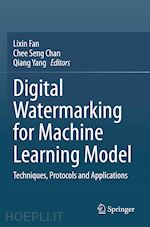
Questo prodotto usufruisce delle SPEDIZIONI GRATIS
selezionando l'opzione Corriere Veloce in fase di ordine.
Pagabile anche con Carta della cultura giovani e del merito, 18App Bonus Cultura e Carta del Docente
Machine learning (ML) models, especially large pretrained deep learning (DL) models, are of high economic value and must be properly protected with regard to intellectual property rights (IPR). Model watermarking methods are proposed to embed watermarks into the target model, so that, in the event it is stolen, the model’s owner can extract the pre-defined watermarks to assert ownership. Model watermarking methods adopt frequently used techniques like backdoor training, multi-task learning, decision boundary analysis etc. to generate secret conditions that constitute model watermarks or fingerprints only known to model owners. These methods have little or no effect on model performance, which makes them applicable to a wide variety of contexts. In terms of robustness, embedded watermarks must be robustly detectable against varying adversarial attacks that attempt to remove the watermarks. The efficacy of model watermarking methods is showcased in diverse applications including image classification, image generation, image captions, natural language processing and reinforcement learning.
This book covers the motivations, fundamentals, techniques and protocols for protecting ML models using watermarking. Furthermore, it showcases cutting-edge work in e.g. model watermarking, signature and passport embedding and their use cases in distributed federated learning settings.
Part I. Preliminary.- Chapter 1. Introduction.- Chapter 2. Ownership Verification Protocols for Deep Neural Network Watermarks.- Part II Techniques.- Chapter 3. ModelWatermarking for Image Recovery DNNs.- Chapter 4. The Robust and Harmless ModelWatermarking.- Chapter 5. Protecting Intellectual Property of Machine Learning Models via Fingerprinting the Classification Boundary.- Chapter 6. Protecting Image Processing Networks via Model Water.- Chapter 7. Watermarks for Deep Reinforcement Learning.- Chapter 8. Ownership Protection for Image Captioning Models.- Chapter 9.Protecting Recurrent Neural Network by Embedding Key.- Part III Applications.- Chapter 10. FedIPR: Ownership Verification for Federated Deep Neural Network Models.- Chapter 11. Model Auditing For Data Intellectual Property
Lixin Fan is currently the Chief Scientist of Artificial Intelligence at WeBank, Shenzhen, China. His research interests include machine learning and deep learning, privacy computing and federated learning, computer vision and pattern recognition, image and video processing, mobile computing and ubiquitous computing. He was the Organizing Chair of workshops in these research areas held in CVPR, ICCV, ICPR, ACCV, NeurIPS, AAAI, and IJCAI. He is the author of 3 edited books and more than 70 articles in peer-review international journals and conference proceedings. He holds more than one hundred patents filed in the United States, Europe and China, and he was Chairman of the IEEE P2894 Explainable Artificial Intelligence (XAI) Standard Working Group.
Chee Seng Chan is currently a Full Professor at the Faculty of Computer Science and Information Technology, Universiti Malaya, Kuala Lumpur, Malaysia. His research interests include computer vision and machine learning where he has published more than 100 papers in related top peer-review conferences and journals. He was the Organizing Chair of the Asian Conference on Pattern Recognition (2015) and General Chair of the IEEE Workshop on Multimedia Signal Processing (2019) and IEEE Visual Communications and Image Processing (2013). He was the recipient of Top Research Scientists Malaysia (TRSM) in 2022, Young Scientists Network Academy of Sciences Malaysia (YSN-ASM) in 2015 and Hitachi Research Fellowship in 2013. Besides that, he is also a senior member (IEEE), Professional Engineer (BEM) and Chartered Engineer (IET). During 2020-2022, he was seconded to the Ministry of Science, Technology and Innovation (MOSTI) as the Undersecretary for Division of Data Strategic and Foresight.
Qiang Yang is a Fellow of the Canadian Academy of Engineering (CAE) and Royal Society of Canada (RSC), Chief Artificial Intelligence Officer of WeBank,and Chair Professor at the Computer Science and Engineering Department of Hong Kong University of Science and Technology (HKUST). He is the Conference Chair of AAAI-21, Honorary Vice President of the Chinese Association for Artificial Intelligence (CAAI), President of the Hong Kong Society of Artificial Intelligence and Robotics (HKSAIR) and President of the Investment Technology League (ITL). He is a fellow of the AAAI, ACM, CAAI, IEEE, IAPR and AAAS. He was the Founding Editor in Chief of the ACM Transactions on Intelligent Systems and Technology (ACM TIST) and the Founding Editor in Chief of IEEE Transactions on Big Data (IEEE TBD). He received the ACM SIGKDD Distinguished Service Award in 2017. He served as Founding Director of Huawei’s Noah’s Ark Research Lab from 2012 to 2015, Founding Director of HKUST’s Big Data Institute, Founder of 4Paradigm and President of the IJCAI (2017-2019). His research interests include artificial intelligence, machine learning, data mining andplanning.











Il sito utilizza cookie ed altri strumenti di tracciamento che raccolgono informazioni dal dispositivo dell’utente. Oltre ai cookie tecnici ed analitici aggregati, strettamente necessari per il funzionamento di questo sito web, previo consenso dell’utente possono essere installati cookie di profilazione e marketing e cookie dei social media. Cliccando su “Accetto tutti i cookie” saranno attivate tutte le categorie di cookie. Per accettare solo deterninate categorie di cookie, cliccare invece su “Impostazioni cookie”. Chiudendo il banner o continuando a navigare saranno installati solo cookie tecnici. Per maggiori dettagli, consultare la Cookie Policy.